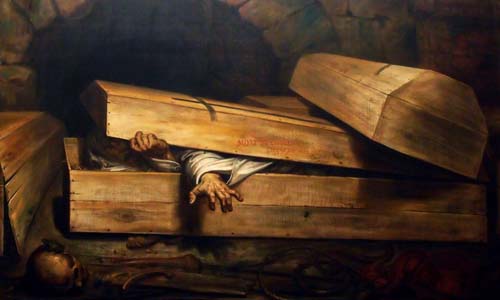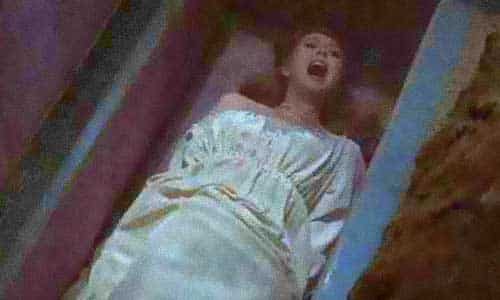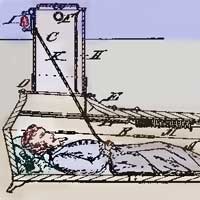Taphephobia is the fear of being buried alive, reports NICOLA CARPENTER

Darkness. It started with darkness and silence. Silence punctuated only by the sound of shuddering breath. Movement was painfully stiff, muscle screamed as he tried to sit up but something solid prevented him. Fumbling blindly he tried to paint a picture of his surroundings with his hands, his fingertips brushed against the rough wood imprisoning him. A box? No a coffin!
What is Taphephobia?
Taphephobia, an abnormal or irrational fear of being buried alive. From the Greek taphos, meaning tomb or grave and phobos meaning fear.
Taphephobia experienced its ‘golden hour’ during the Victorian era, when death was a deadly business.
Not only did one have to worry about grave robbers digging you up and carting you off for dissection, you had to worry about being properly dead in the first place.
But the Victorians had real reason to fear being buried alive, death in those days was not as simple to certify as it is today and several cases of premature burial were reported not only in the 19th century but in previous centuries as well.
The case of Matthew Wall
On 2 October 1571, the recently deceased Matthew Wall, a young farmer from Braughing Hertfordshire was being carried in his coffin on the way to his funeral.
The day was damp and cool and the whole village, including his beloved, had turned out to line the path the coffin would take.
As the procession neared the church one of the pall-bearers slipped, causing the others to drop the coffin.
When the coffin was lifted again everyone was shocked hear knocking coming from inside.
The jolt from being dropped had wakened Matthew from his slumbers. Matthew lived for a further 24 years after his narrow escape from the grave, eventually dying in 1595.
To this day the village of Braughing celebrate Matthew’s resurrection, each year on 2nd October, when village children bring brooms to sweep away leaves on the path leading to the church.
Marjorie McCall was buried alive twice
Then there is the legend of Marjorie McCall of Ireland; lived once, buried twice, as her gravestone tells us.
The story is that Marjorie, a doctors wife had succumbed to a terrible fever. So that the fever would not spread she was dispatched to her grave in record time, still wearing her expensive wedding ring.
That night before the earth had even settled, two body snatchers dug up Marjorie and set about relieving her of her jewellery, only her wedding ring would not budge from her stiff finger. It was decided that the finger would have to come off, a knife was produced and they set about the grim task.

As soon as the first incision was made Marjorie came round from her repose, sat bolt upright and shrieked. That was enough for the body snatchers, who fled into the night. Marjorie then climbed out of her gaping grave and made her way home to where her husband, John and assorted relatives were toasting her final farewell.
The grieving party heard a faint rapping at the door, which was opened to reveal Marjorie fresh from the grave, still in her burial attire. Her husband fainted and in some accounts dropped dead with fright and was buried in the grave Marjorie had just vacated.
Why did Taphephobia exist?
With accounts such as these passed from generation to generation is it any wonder the fear of being buried alive took over the thoughts of ordinary Victorian folk.
Such was the fear that you would awaken in the dark confines of your own grave several ‘safety coffins’ were patented incorporating many communication devices such as bells and flags that could be activated by the occupant, should they suddenly revive after burial.
Other variations included ladders, escape hatches and even feeding tubes, however many overlooked the need for ventilation, condemning those within to a slow suffocating death, that is if they weren’t dead already.
Not all (in fact probably none) of these ‘safety coffins’ were effective.
Many of the systems using cords tied to the corpse suffered from the natural decay of the human body, which would often swell and shift position giving many false positives.
To combat this some coffins were fitted with a viewing tube over the face of the corpse, that way upon hearing the bell ring the sexton or cemetery keeper could gaze into the coffin to ascertain the actual state of death. Once death was confirmed the tube was removed.
So taphephobia is a dark outdated fear buried in the past?
Simply, no. Safety coffins are still being patented to this day. Gone are the bells and flags, replaced by webcams and videophones.
That would make for one very interesting Twitter update.
For more creepy topics from Berkshire’s NICOLA CARPENTER, you can read her blog here.









I will be having it in my will (when I finally get round to writing it) that I want my major arteries severed before cremation or burial. On the other hand, I would like to be entombed in a crypt, with all mod cons and the lid not quite nailed down, so if I should come round I can survive for a bit before being discovered. If I'm definitely dead then the kids have got an uber cool den to chillax in right near their dear old mum….
Think they'll probably go for option 1, however.